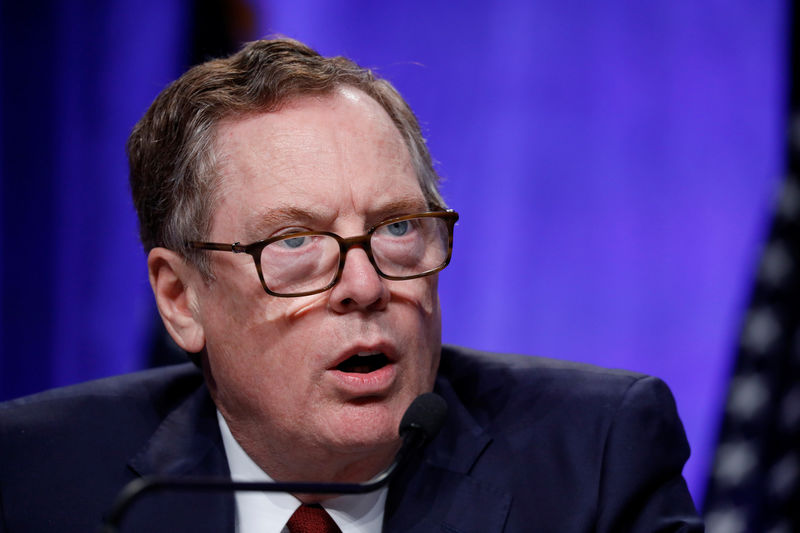By Dave Graham and Anthony Esposito
MEXICO CITY (Reuters) - Trade negotiators from Canada, the United States and Mexico presented more proposals for a renewed North American Free Trade Agreement on Friday and tried to put behind them threats from U.S. President Donald Trump to pull out of the treaty.
Teams from the three countries kicked off a second round of talks in Mexico City on 25 areas of closed-door discussion, with subjects such as digital commerce and small businesses seen as areas where consensus was possible, officials said.
The teams did not debate details, according to officials, but one union leader present said that U.S. Commerce Secretary Wilbur Ross had indicated he favored North American content of more than 70 percent in autos built in the NAFTA region.
Taking up where they left off in Washington talks two weeks ago, the delegations were showing each other proposed language for reworking the accord, without yet seeking to thrash out mutually acceptable compromises, officials present told Reuters.
Trump's multiple attacks on NAFTA in the build-up to the Mexico City round were seen by Mexican and Canadian officials as a ploy to wring concessions, but they have heightened uncertainty over the accord. Away from the diplomatic noise, the Mexico talks are expected to help define the priorities of each nation rather than yield major advances.
Nevertheless, Trump's warnings have Mexico preparing for something hard to imagine even a few months ago - life without the agreement that boosted trilateral trade to around $1 trillion annually from $290 billion in 1993.
The Sept. 1-5 talks will touch on some thorny topics such as rules governing local content in products made in North America, Mexico's economy ministry said in a statement. Substantial discussion of such areas is unlikely in either this round or the next one, a source familiar with the process said.
"We do not expect any major breakthroughs or major developments in this round. We really don't," one official familiar with the negotiating process said.
Mexican officials believe Trump wants to include rules that a certain amount of content must be made in the United States.
The head of Unifor, Canada's largest private sector union, Jerry Dias, told reporters he had suggested in a recent meeting with U.S. Commerce Secretary Ross that the NAFTA content level for autos be raised to 70 percent from the current 62.5 percent. But Ross, he said, had proposed a "more aggressive" level.
Hundreds of small farmers and union members including speakers from Canada gathered outside the Mexican Congress on Friday to demand that NAFTA be reworked to truly help workers.
Trump and Canadian Prime Minister Justin Trudeau spoke by phone on Thursday and stressed they wanted to reach a NAFTA deal by the end of 2017, the White House said. An accord by year end that significantly changes NAFTA is seen as unlikely.
The goal is for an agreement before Mexico's 2018 presidential campaign starts in earnest. Officials fear the campaign will politicize talks, with nationalist frontrunner Andres Manuel Lopez Obrador already recommending a tougher line from Mexico.
Nevertheless, one Mexican official noted that Trump's repeated threats put pressure on his negotiators, forcing them to adopt tougher positions "than they would like," while another official said they were ready to leave the table if needed.
TRUMP THREATS
Trump said this week he might trigger a 180-day countdown to withdraw from NAFTA while the talks were ongoing to help meet his goals, which include sharply reducing a $64 billion annual U.S. trade deficit with Mexico.
NAFTA, first implemented in 1994, eliminates most tariffs on trade between the United States, Canada and Mexico.
Critics say it has drawn jobs from the United States and Canada to Mexico, where workers are paid far lower wages. Supporters say it has created U.S. jobs, and that the loss of manufacturing from the United States has more to do with China than Mexico.
If NAFTA collapses, costs could rise for hundreds of billions of dollars of trade as tariffs are brought back.
Free-trade lobby groups say consumers would be saddled with higher prices and less availability of products ranging from avocados and berries to heavy trucks.
Mexican Economy Minister Ildefonso Guajardo and Foreign Minister Luis Videgaray told officials in Washington on Wednesday that Mexico would walk away from the negotiations if Trump pulls the trigger on withdrawing from the deal.
Juan Pablo Castanon, president of Mexico's Business Coordination Council representing the private sector in the talks, said the country was refining a "Plan B" that could be up and running within three months of an eventual NAFTA collapse.
Talking on Mexican television, he said the plan included striking new trade arrangements in Asia and Latin America, sourcing alternate suppliers such as Brazil for grains now imported from the United States, and finding ways to recreate investor guarantees that are included in NAFTA.
Graphic on trade battles: http://tmsnrt.rs/2oYClp2

Graphic: NAFTA's benefit to the breadbasket - http://tmsnrt.rs/2tNMtlc